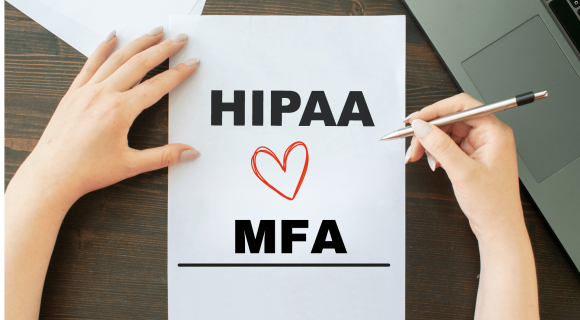For small medical practices, HIPAA compliance means implementing robust safeguards to ensure patient data is protected from unauthorized access, breaches, and other security incidents. Some may be surprised to learn that you can’t spell HIPAA without MFA. Let me explain.
Traditional authentication systems require only one verification factor, such as a password, to gain access to an application or system. Bad actors can easily steal these passwords and gain access to your network. Did you know that it takes an average of 341 days to contain and remediate a data breach caused by exploited credentials? Not to mention the expense and the lost brand trust your organization incurs due to the event.
Modern problems require modern solutions, and this is where Multi-factor Authentication (MFA) comes in.
Why You Need MFA
MFA is a security system that requires more than one method of authentication from independent categories of credentials to verify the user’s identity for a login or other transaction. MFA combines two or more independent credentials: what the user knows (password), what the user has (security token), and what the user is (biometric verification).
In the context of HIPAA, MFA is not just an added layer of security; it’s a necessity. It significantly reduces the risk of unauthorized access to patient data by ensuring that the person trying to access the information is indeed who they claim to be.
And while this might seem like a no brainer for some, there are many healthcare providers who dislike the “inconvenience” that comes with this added layer of security. For example, you may want to log into your EMR but in order to do that it requires multiple steps. First you have to submit your password, which automatically generates an email that provides you with a code. You then take that code and type it in so that you may gain access to your EMR. Yes, it can be an annoyance, but it’s also necessary in order to avoid the major and real inconvenience of a cyber incident.
Why MFA Matters for Small Medical Practices
Not sold on MFA yet? Let me share some practical and important reasons MFA matters when it comes to HIPAA compliance.
Enhanced Security: Small medical practices are not immune to cyber threats. In fact, their often limited cybersecurity defenses make them attractive targets for cybercriminals. We don’t see this letting up anytime soon, as 2023 broke records for both the most reported data breaches and the most breached records. MFA adds an extra layer of security that can deter potential breaches.
Compliance: HIPAA’s Security Rule implicitly requires MFA by mandating practices to implement procedures to verify that a person or entity seeking access to electronic protected health information is the one claimed. Failing to incorporate MFA could result in non-compliance penalties.
Building Patient Trust: Patients entrust their most personal information to their healthcare providers. Implementing MFA demonstrates a commitment to safeguarding this information and helps avoid a breach, which allows for an ongoing positive relationship between the client and the practice.
Cost-effective Security Investment: For small practices operating on tight budgets, MFA offers a cost-effective security solution. It’s a small but mighty tool in your HIPAA toolkit.
Implementing MFA in Small Healthcare Practices
Implementing MFA requires planning and consideration. Start by assessing your specific needs, especially considering the sensitivity of the patient information you manage. Your IT team can work directly with members of your senior team to assess your requirements and come up with a plan for vendor selection and implementation. There are many MFA options available. Some factors to consider include ease of use, how well it integrates with your existing systems, and the overall cost. Once you’ve implemented your MFA solution, you have to roll it out to your staff. It’s equally important to educate your team on the critical role of MFA and ensure they are proficient in using it effectively. Once you’ve rolled out your new MFA solution, the work doesn’t end there. To maintain a high level of security, you should continuously monitor your MFA solution for any potential vulnerabilities and make sure it is regularly updated to safeguard against new threats. With the right IT team, implementing and maintaining an MFA solution should be a simple and painless process. Not only will it help with HIPAA compliance, but you’ll have peace of mind knowing your healthcare practice is more secure against cyber threats than it was yesterday.

